
Muraqabah 01 – amour, présence, annihilation
Des réalités de Mawlana Shaykh (Q) telles qu’enseignées par Shaykh Nurjan Mirahmadi
A’udhu Billahi Minash Shaitanir Rajeem
Bismillahir Rahmanir Raheem
Je cherche refuge en Allah contre le diable banni
Au Nom d’Allah, le Tout Miséricordieux, le Très Miséricordieux,
Alhamdulillahi Rabb al-‘Alameen, as-salaatu wa salaamu ashraf al-mursaleen. Sayyidina wa Mawlana Muhammad al-Mustafa ﷺ. Madad yaa sayyidi Sultan al-Awliya Mawlana Shaykh Muhammad Nazim al-Haqqani, madad yaa sayyidi ya Mawlana Shaykh Hisham Kabbani. Unzur haalana isfalana bi madadakum bi nazarakum.
Alhamdulillah, nous demandons d’entrer dans les Océans de Rahmah d’Allah (AJ) et d’etre non-existant et de partager à propos de leurs enseignements, toujours pour moi-meme.
La muraqabah est l’étape ultime de notre voyage spirituel
 Voici un rappel dans la compréhension de la muraqabah (connexion spirituelle). Dont beaucoup de gens parlent et que beaucoup de sites divers décrivent. Et de la Naqshbandiyya al-Aliyya [sont issus] des sites web autorisés, des enseignements autorisés. Ceci est la finalité d’un chemin spirituel. La muraqabah [qui sert à] faire la connexion avec le cœur, faire la connexion avec l’âme, est l’étape ultime. Ce n’est pas la phase initiale du tariq (chemin). C’est plutôt un chemin dans lequel nous entrons par la porte. Son résultat ultime est d’être dans un état de tafakkur (contemplation), de tazakkir (souvenir), et de se rappeler de ce dont Allah (AJ) a habillé l’âme. « Alam al-Qur’an, khalaq al-insan », se souvenir qu’Allah (AJ) a accordé à l’âme de nombreux trésors divins. Et la porte d’entrée dans cette réalité est à travers le cœur.
Voici un rappel dans la compréhension de la muraqabah (connexion spirituelle). Dont beaucoup de gens parlent et que beaucoup de sites divers décrivent. Et de la Naqshbandiyya al-Aliyya [sont issus] des sites web autorisés, des enseignements autorisés. Ceci est la finalité d’un chemin spirituel. La muraqabah [qui sert à] faire la connexion avec le cœur, faire la connexion avec l’âme, est l’étape ultime. Ce n’est pas la phase initiale du tariq (chemin). C’est plutôt un chemin dans lequel nous entrons par la porte. Son résultat ultime est d’être dans un état de tafakkur (contemplation), de tazakkir (souvenir), et de se rappeler de ce dont Allah (AJ) a habillé l’âme. « Alam al-Qur’an, khalaq al-insan », se souvenir qu’Allah (AJ) a accordé à l’âme de nombreux trésors divins. Et la porte d’entrée dans cette réalité est à travers le cœur.
﴾عَلَّمَ الْقُرْآنَ ﴿٢﴾ خَلَقَ الْإِنسَانَ ﴿٣
55:2-3 – “Allamal Qur’an (2). Khalaqal Insaan (3).” (Surat Ar Rahman)
« C’est Lui qui a enseigné le Coran. (2) Il a créé l’humanité. (3) » (Le Miséricordieux, 55, 2-3)
Les réalités du cœur ne s’ouvrent qu’à travers le Tafakkur (contemplation) et la Muraqabah (connexion spirituelle)
 Mawlana Shaykh décrit les réalités qui ont été données aux awliyaullah (saints) par l’ouverture de leur cœur. Ces réalités du cœur ne peuvent être atteintes que par la porte du tafakkur (contemplation) et de la muraqabah (connexion spirituelle). C’est l’état de cette réalité qui ouvre toutes les réalités et les trésors du cœur. Les haqaiq (réalités) du juzba (pouvoir d’attraction) ne viennent pas de nous. La réalité du faiz (pouvoir d’émanation) n’est pas de nous. Ce n’est pas un secret qui nous appartient mais que la muraqabah (connexion spirituelle) ouvrira pour nous; le tafakkur ouvrira pour nous la présence de la muhabbat (amour).
Mawlana Shaykh décrit les réalités qui ont été données aux awliyaullah (saints) par l’ouverture de leur cœur. Ces réalités du cœur ne peuvent être atteintes que par la porte du tafakkur (contemplation) et de la muraqabah (connexion spirituelle). C’est l’état de cette réalité qui ouvre toutes les réalités et les trésors du cœur. Les haqaiq (réalités) du juzba (pouvoir d’attraction) ne viennent pas de nous. La réalité du faiz (pouvoir d’émanation) n’est pas de nous. Ce n’est pas un secret qui nous appartient mais que la muraqabah (connexion spirituelle) ouvrira pour nous; le tafakkur ouvrira pour nous la présence de la muhabbat (amour).
Cela signifie qu’ils [les awliyaullah] commencent à enseigner : ces réalités du cœur, elles ne s’ouvriront pas sans cette muraqabah, sans cette sorte de stade final dans lequel les étudiants atteignent ces états dans lesquels Allah (AJ) veut les vêtir. Que ce tawassul (pouvoir de véhiculer), tawajju (pouvoir de focaliser), toutes ces réalités, le haqaiq d’irshad (pouvoir de guider), le haqaiq de tayy (pouvoir du mouvement – mouvement à travers la langue et le mouvement à travers le corps) – que ces réalités ne peuvent pas s’ouvrir sans l’état de tafakkur et de muraqabah.
Cela signifie qu’ils décrivent les réalités du cœur, les trésors du cœur, comme un objectif que nous voulons atteindre. Parce qu’ils disent : « Pourquoi prendre cette voie? Pourquoi prendre cette difficulté? Pourquoi prendre ces réalités? Et puis ils décrivent : ce sont les trésors qu’Allah (AJ) a accordés.
Les trois portes de Muhabbat, Hudur et Fana
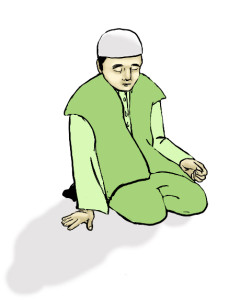 Puis ils [les maîtres] commencent à enseigner cela : la porte d’entrée de cette réalité est la compréhension de la muraqabah. Et la muraqabah est un état de muhabbat (amour). (Parce que les gens parlent de toutes sortes de choses mais ils laissent de côté l’essentiel.)
Puis ils [les maîtres] commencent à enseigner cela : la porte d’entrée de cette réalité est la compréhension de la muraqabah. Et la muraqabah est un état de muhabbat (amour). (Parce que les gens parlent de toutes sortes de choses mais ils laissent de côté l’essentiel.)
Les saints possèdent les trois portes qui sont : la porte de muhabbat (amour), la porte de hudur (présence) et la porte de fana (annihilation). Ils s’inspirent des réalités du Saint Coran – ce serait matière à une autre vidéo et pour quelqu’un de plus versé en langue arabe [que moi] – mais Allah (AJ) dit tout au long du saint Coran que, “wa Kono ma’as sadiqeen”, « ayez une conscience d’Allah (AJ), gardez la compagnie des sadiqeens ».
﴾يَا أَيُّهَا الَّذِينَ آمَنُوا اتَّقُوا اللّهَ وَكُونُوا مَعَ الصَّادِقِينَ ﴿١١٩
9:119 – “Ya ayyuhal ladheena amanoo ittaqollaha wa kono ma’as sadiqeen.” (Surat At-Tawba)
« Ô vous qui avez cru, ayez conscience d’Allah et soyez avec ceux qui sont véridiques / pieux / sincères (en paroles et en actes) » (La repentance, 9, 119)
Il existe un moyen d’approcher la Présence Divine
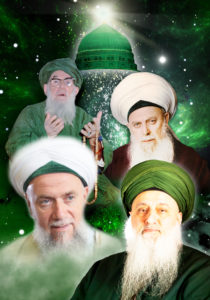 Qu’Allah (AJ) dit, « Cherche les réalités mais cherche-les à travers un moyen menant vers Allah (AJ). Et tenez fermement à la corde d’Allah (AJ) tous ensemble et ne vous séparez pas. » (Coran 3:103) Tous ces signes étaient ceux par lesquels Allah (AJ) enseigne « Il y a un moyen par lequel approcher Ma Présence Divine. »
Qu’Allah (AJ) dit, « Cherche les réalités mais cherche-les à travers un moyen menant vers Allah (AJ). Et tenez fermement à la corde d’Allah (AJ) tous ensemble et ne vous séparez pas. » (Coran 3:103) Tous ces signes étaient ceux par lesquels Allah (AJ) enseigne « Il y a un moyen par lequel approcher Ma Présence Divine. »
﴾وَاعْتَصِمُوا بِحَبْلِ اللَّـهِ جَمِيعًا وَلَا تَفَرَّقُوا ۚ ﴿١٠٣
3:103 – “Wa’tasimo bihab lillahi jamee’an wa la tafarraqo…” (Surat Ali-Imran)
“Et tenez fermement à la corde d’Allah (AJ) tous ensemble et ne vous séparez pas…” (La famille d’Imran, 3:103)
Et Bismillah ar-Rahmaan ar-Raheem Atiullaha wa atiur Rasul wa Ulil amre minkum.
﴾ياأَيُّهَا الَّذِينَ آمَنُوا أَطِيعُواللَّه وَأَطِيعُوٱلرَّسُولَ وَأُوْلِي الْأَمْرِ مِنْكُمْ… ﴿٥٩
4:59 – “Ya ayyu hal latheena amanoo Atiullaha wa atiur Rasola wa Ulil amre minkum…” (Surat An-Nisa)
“ Ô vous qui avez cru, obéissez à Allah, obéissez au Messager et à ceux qui ont autorité parmi vous…” (Les femmes, 4:59)
Cela signifie qu’à travers ce saint ayat (verset), Mawlana Shaykh ouvre toutes ces réalités pour nous permettre de comprendre que c’est l’obéissance à Allah (AJ) que nous voulons. Nous voulons être obéissants à Allah (AJ), nous voulons être obéissants à Sayyidina Muhammad ﷺ; et Allah (AJ) accorde une rahmah (miséricorde) à travers les ulul amr (saints).
Parce que les ulul amr (saints) vivent parmi nous, avec nous, afin que nous puissions manger avec eux, nous puissions prier avec eux, nous puissions être avec eux et ils commencent à nous vêtir de cette réalité. Nous l’avons dit beaucoup de fois, comme une corde (Allah (AJ) décrit), descendue du ciel : comme une corde télescopique. Elle se rend jusqu’à nous pour nous élever. Et alors qu’elle commence à remonter elle nous élève à la réalité des cieux.
Les réalités ne peuvent être atteintes par notre Soi, le «Soi» équivaut à «l’Ego»
 Allah (AJ) ne s’attend pas à ce que nous le fassions par nous-mêmes, que nous tombions simplement sur quelques informations et que nous essayions d’achever une réalité. Cela est virtuellement impossible à réaliser par le soi, parce que c’est le soi qui cause tous les problèmes. En Occident, ils ont embelli le mot « soi » où nous l’appelons « ego ». Vous ne pouvez pas compter sur vous-même, vous ne pouvez pas compter sur votre ego. Vous ne pouvez pas vous faire confiance, vous ne pouvez pas faire confiance à votre ego. Vous ne pouvez pas être auto-suffisant et ego-suffisant. C’est ce mauvais caractère qui nous bloque de cette réalité.
Allah (AJ) ne s’attend pas à ce que nous le fassions par nous-mêmes, que nous tombions simplement sur quelques informations et que nous essayions d’achever une réalité. Cela est virtuellement impossible à réaliser par le soi, parce que c’est le soi qui cause tous les problèmes. En Occident, ils ont embelli le mot « soi » où nous l’appelons « ego ». Vous ne pouvez pas compter sur vous-même, vous ne pouvez pas compter sur votre ego. Vous ne pouvez pas vous faire confiance, vous ne pouvez pas faire confiance à votre ego. Vous ne pouvez pas être auto-suffisant et ego-suffisant. C’est ce mauvais caractère qui nous bloque de cette réalité.
Nous ne pouvons atteindre le Fana sans le Muhabbat et l’Hudur
 Ensuite, ils commencent à enseigner (comme dans un cours 101) la compréhension que ces trois portes constituent la base. Que si nous voulons atteindre Allah (AJ), nous devons passer par le Prophète ﷺ; et du Prophète ﷺ, nous devons être avec les ulul amr (ceux en autorité). Donc, toute notre vie sera basée sur notre relation avec les ulul amr. Et les ulul amr (saints), il y en a 124,000 qui ont atteint à cette réalité du Saint Coran – qui sont en obéissance à Allah (AJ), qui sont en obéissance à Sayyidina Muhammad ﷺ et ils sont en obéissance aux ulul amr, les gens en autorité au-dessus d’eux (ils sont en dessous d’eux). Ils ont le akhlaq (un caractère) qu’Allah (AJ) a ouvert dans leur âme : la sainteté.
Ensuite, ils commencent à enseigner (comme dans un cours 101) la compréhension que ces trois portes constituent la base. Que si nous voulons atteindre Allah (AJ), nous devons passer par le Prophète ﷺ; et du Prophète ﷺ, nous devons être avec les ulul amr (ceux en autorité). Donc, toute notre vie sera basée sur notre relation avec les ulul amr. Et les ulul amr (saints), il y en a 124,000 qui ont atteint à cette réalité du Saint Coran – qui sont en obéissance à Allah (AJ), qui sont en obéissance à Sayyidina Muhammad ﷺ et ils sont en obéissance aux ulul amr, les gens en autorité au-dessus d’eux (ils sont en dessous d’eux). Ils ont le akhlaq (un caractère) qu’Allah (AJ) a ouvert dans leur âme : la sainteté.
Donc à partir de cette réalité ils enseignent qu’il doit y avoir le stade du muhabbat (amour). Et ils vont nous enseigner aux trois niveaux. Il doit y avoir le muhabbat, il doit y avoir le hudur (la présence) et ce muhabbat et le hudur vont commencer à ouvrir le fana qui est la relation d’annihilation.
Muhabbat, Hudur et Fana dans le Shaykh et dans le Prophète ﷺ ouvrent l’Amour d’Allah
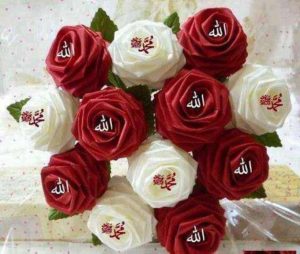 [Cette relation] ce sera avec les ulul amr (saints). Une fois que nous avons maîtrisé cette compréhension et tiré notre vie de cette compréhension, cela devient le même principe. Cela devient le muhabbat du Prophète ﷺ, essayant de garder le hudur et la présence de Sayyidina Muhammad ﷺ et en étant alors dans le fana de Sayyidina Muhammad ﷺ, qui commence à ouvrir dans le cœur du Prophète ﷺ les réalités de l’amour d’Allah (AJ). Cela signifie « Qul in kuntum tuhibbunAllah fattabiooni yuhbibkumullah. »
[Cette relation] ce sera avec les ulul amr (saints). Une fois que nous avons maîtrisé cette compréhension et tiré notre vie de cette compréhension, cela devient le même principe. Cela devient le muhabbat du Prophète ﷺ, essayant de garder le hudur et la présence de Sayyidina Muhammad ﷺ et en étant alors dans le fana de Sayyidina Muhammad ﷺ, qui commence à ouvrir dans le cœur du Prophète ﷺ les réalités de l’amour d’Allah (AJ). Cela signifie « Qul in kuntum tuhibbunAllah fattabiooni yuhbibkumullah. »
﴾قُلْ إِنْ كُنْتُمْ تُحِبُّوْنَ اللَّـهَ فَاتَّبِعُوْنِيْ يُحْبِبْكُمُ اللَّـهُ وَيَغْفِرْ لَكُمْ ذُنُوْبَكُمْ ۗ وَاللَّـهُ غَفُورٌ رَّحِيمٌ ﴿٣١
3:31 – “Qul in kuntum tuhibbon Allaha fattabi’oni, yuhbibkumullahu wa yaghfir lakum dhunobakum wallahu Ghaforur Raheem.” (Surat Ali-Imran)
« Dis, [O Muhammad], « Si tu aimes Allah, alors suis-moi, [ainsi] Allah t’aimera et te pardonnera tes péchés. Et Allah est Pardonneur et Miséricordieux. » (Famille d’Imran, 3:31)
Que là, dans le cœur et l’amour de Sayyidina Muhammad ﷺ, commence à s’ouvrir le plus haut niveau, qui est le véritable amour d’Allah (AJ) qui est entièrement englobé par l’amour de Sayyidina Muhammad ﷺ. Et se trouver dans ce hudur, dans cette Présence Divine, et être anéanti en cette Présence est le but ultime. Lorsque cela commence à s’accomplir, les lumières du cœur commencent à s’ouvrir.
Cela signifie que la réalité et les six pouvoirs du cœur commencent à s’ouvrir. Les lata’if (points d’énergie subtile) du cœur commencent à s’ouvrir parce que les lumières de ce dont ils nous forment, ces lumières et leur nazar (regard), commencent à ouvrir ces réalités.
La première porte est celle des Ulul Amr (Ceux en autorité)
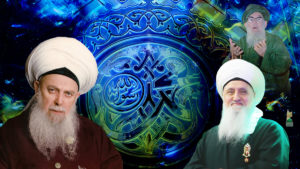 Donc cela signifie que nous allons à la porte numéro un qui est la relation aux ulul amr (ceux en autorité). Et que [cette relation avec] les ulul amr, elle doit être basée sur le muhabbat (amour), et qu’ils doivent l’approuver. Il n’y a rien qui peut être à la fois atteint et volé. Vous ne pouvez pas l’arracher et la voler. Il n’y a rien à prendre. Cela doit être une station de muhabbat, atteinte par les bonnes manières, par le bon caractère, par l’adab et la discipline. C’est pourquoi leurs écoles sont remplies de discipline. Ce que les gens ne comprennent pas c’est qu’ils vont à leur mosquée habituelle puis disent : « Vous n’êtes pas comme l’imam à la mosquée et vous avez, comme, des règles différentes ». Parce qu’un est le niveau de la maternelle et l’autre du doctorat!
Donc cela signifie que nous allons à la porte numéro un qui est la relation aux ulul amr (ceux en autorité). Et que [cette relation avec] les ulul amr, elle doit être basée sur le muhabbat (amour), et qu’ils doivent l’approuver. Il n’y a rien qui peut être à la fois atteint et volé. Vous ne pouvez pas l’arracher et la voler. Il n’y a rien à prendre. Cela doit être une station de muhabbat, atteinte par les bonnes manières, par le bon caractère, par l’adab et la discipline. C’est pourquoi leurs écoles sont remplies de discipline. Ce que les gens ne comprennent pas c’est qu’ils vont à leur mosquée habituelle puis disent : « Vous n’êtes pas comme l’imam à la mosquée et vous avez, comme, des règles différentes ». Parce qu’un est le niveau de la maternelle et l’autre du doctorat!
Ceci est une voie de ma’rifah (gnosticisme) et une voie de connaissance du soi pour connaître Allah (AJ). Et l’inverse est encore plus vrai : si vous ne vous connaissez pas vous-même alors il est impossible de dire que vous connaissez Allah (AJ). Comment puis-je connaître le Créateur si je ne sais rien à propos de moi?
مَنْ عَرَفَ نَفْسَهْ فَقَدْ عَرَفَ رَبَّهُ
“Man ‘arafa nafsahu faqad ‘arafa Rabbahu”
«Qui se connaît, connaît son Seigneur.» Prophète Muhammad (pssl)
Ainsi les écoles de ma’rifah commenceront à enseigner que vous devez trouver les ulul amr, 124,000 ulul amr autorisés (saints). Leurs cœurs ont été ouverts, ils sont vêtus de cette réalité. Ils vous enseigneront la structure de cette réalité et les niveaux dans lesquels se connecter.
1. Muhabbat (Amour) – Le Muhabbat est basé sur l’honneur et le respect
 Mais le plus important, pour cette compréhension, est leur muhabbat (amour). Ce sont donc les portes du muhabbat que nous pénétrons en leur présence et par lesquelles nous apprenons la réalité de l’amour (la réalité de l’amour et du respect). Et la plus grande difficulté de cette porte est de comprendre cet amour, de comprendre ce respect. Ensuite, les gens commencent à se demander : « Pourquoi y a-t-il tant de respect ici versus ce qui se passe à la mosquée? » Parce que nous les étudiants, nous essayons tous d’atteindre (et d’atteindre continuellement) les darajats (niveaux) du muhabbat (amour) parce que le muhabbat est basé sur le tashreef (honneur) et l’ihtiram (le respect).
Mais le plus important, pour cette compréhension, est leur muhabbat (amour). Ce sont donc les portes du muhabbat que nous pénétrons en leur présence et par lesquelles nous apprenons la réalité de l’amour (la réalité de l’amour et du respect). Et la plus grande difficulté de cette porte est de comprendre cet amour, de comprendre ce respect. Ensuite, les gens commencent à se demander : « Pourquoi y a-t-il tant de respect ici versus ce qui se passe à la mosquée? » Parce que nous les étudiants, nous essayons tous d’atteindre (et d’atteindre continuellement) les darajats (niveaux) du muhabbat (amour) parce que le muhabbat est basé sur le tashreef (honneur) et l’ihtiram (le respect).
Ce que vous apprenez ici, vous l’appliquerez aux plus grands shaykhs, aux plus grands ulul amr. Vous l’appliquerez aux ulul amr (saints) que vous voyez et à ceux que vous ne voyez pas parce que vous n’avez pas été entrainés [à les percevoir]. Si vous n’avez pas été formé, vous allez essayer de mordre la main du ulul amr au-dessus de vous, ou mordre la main, astaghfirullah, de Sayyidina Muhammad ﷺ – ce qui est impossible! C’est pourquoi ils montent la garde et disent : « Pas de fous admis en cette présence ». Ils enseignent que « Vous vous appliquez à suivre une discipline, et vous vous appliquez [à parfaire] votre caractère, vous vous appliquez à augmenter votre amour, vous vous appliquez à éprouver et offrir tout votre respect ». Et tout ceci nous l’utiliserons toute notre vie.
L’Adab (bonnes manières) est le fondement de l’École de l’Amour
 Alors vous les voyez dans leur adab (manières) quel type d’amour ils ont, quel type de caractéristiques ils ont, quel type d’ihtiram (respect) et tashreef (honneur) ils ont. Parce qu’ils ont été formés, ceci est l’océan de l’amour. Ce respect, ils l’utiliseront quand les grands ulul amr viendront. Parce que si vous ne l’avez pas et que vous voyez un de ces grands ulul amr, vous n’aurez pas plus de respect envers un petit, un grand ou un invisible ulul amr. Tout est basé sur les bonnes manières. Tout est basé sur l’adab. C’est donc l’école du muhabbat (amour).
Alors vous les voyez dans leur adab (manières) quel type d’amour ils ont, quel type de caractéristiques ils ont, quel type d’ihtiram (respect) et tashreef (honneur) ils ont. Parce qu’ils ont été formés, ceci est l’océan de l’amour. Ce respect, ils l’utiliseront quand les grands ulul amr viendront. Parce que si vous ne l’avez pas et que vous voyez un de ces grands ulul amr, vous n’aurez pas plus de respect envers un petit, un grand ou un invisible ulul amr. Tout est basé sur les bonnes manières. Tout est basé sur l’adab. C’est donc l’école du muhabbat (amour).
Nous avons besoin des Ulul Amr pour signer notre Ijaza (Permission)
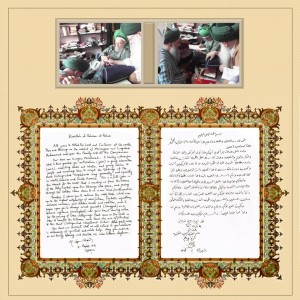 Alors le muhabbat commence maintenant, c’est comme une clé. Ils commencent à enseigner : c’est avec ce muhabbat que vous avez, l’amour que vous avez, le respect que vous montrez. Votre ego vous dit que vous n’avez pas besoin de montrer [cet amour et ce respect] pour cette personne. Mais alors, vous n’obtenez aucune clé parce que cet ulul amr (saint) doit vous approuver. Vous savez, quand vous allez à l’université et que vous voulez obtenir votre diplôme, vous ne pouvez pas dire « Non, non. Mon professeur de mathématiques va me donner mon certificat ». Si votre professeur de physique ou d’histoire ne signe pas, vous n’aurez pas de diplôme. Vous pouvez avoir toutes les signatures que vous voulez dans la vie et vous trouverez que votre cœur n’a jamais ouvert. Ce n’est pas « vous sélectionnez et choisissez ce que vous voulez », mais il y a des gens à qui Allah (AJ) a donné un savoir spécifique. Et vous ne trouverez cette connaissance nulle part sur cette terre.
Alors le muhabbat commence maintenant, c’est comme une clé. Ils commencent à enseigner : c’est avec ce muhabbat que vous avez, l’amour que vous avez, le respect que vous montrez. Votre ego vous dit que vous n’avez pas besoin de montrer [cet amour et ce respect] pour cette personne. Mais alors, vous n’obtenez aucune clé parce que cet ulul amr (saint) doit vous approuver. Vous savez, quand vous allez à l’université et que vous voulez obtenir votre diplôme, vous ne pouvez pas dire « Non, non. Mon professeur de mathématiques va me donner mon certificat ». Si votre professeur de physique ou d’histoire ne signe pas, vous n’aurez pas de diplôme. Vous pouvez avoir toutes les signatures que vous voulez dans la vie et vous trouverez que votre cœur n’a jamais ouvert. Ce n’est pas « vous sélectionnez et choisissez ce que vous voulez », mais il y a des gens à qui Allah (AJ) a donné un savoir spécifique. Et vous ne trouverez cette connaissance nulle part sur cette terre.
Et si vous êtes suffisamment intelligent pour choisir ceux qui ont ces connaissances, vous devez vous entraîner avec eux. Vous devez être autorisé par eux. Leur signature spirituelle doit être appliquée sur votre curriculum vitae pour que les [maîtres] plus élevés commencent à donner. Et c’est tout le concept du muhabbat (amour).
Suivez le programme qu’Allah (AJ) vous a assigné
 Il n’y a pas de rebond, il n’y a pas de saut de tous bords tous côtés. Il n’est pas nécessaire de regarder trop de différentes [vidéos] sur Youtube – elles vont vous confondre. Ce n’est pas une partie du programme que vous devez maîtriser. Il y a un programme spécifique dans lequel Allah (AJ) vous a placé.
Il n’y a pas de rebond, il n’y a pas de saut de tous bords tous côtés. Il n’est pas nécessaire de regarder trop de différentes [vidéos] sur Youtube – elles vont vous confondre. Ce n’est pas une partie du programme que vous devez maîtriser. Il y a un programme spécifique dans lequel Allah (AJ) vous a placé.
Ensuite, si vous regardez ce programme, vous verrez les sites Web – ils ne parlent que de muraqabah (lien spirituel). Sur cette terre, il n’y a pas d’autres sites Web offrant ces enseignements. Ils sont entièrement dévoués au ilm ul-huroof (le savoir des lettres). Et sur cette terre, il n’y a aucun autre site Web enseignant cela. Totalement concernés par le sujet des lata’if (points d’énergie subtils) du cœur – il n’y a pas d’autres sites Web qui enseignent cela. Que tout existe à l’intérieur de cet enseignant et de ces enseignants.
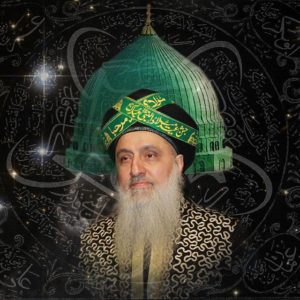 Si vous maîtrisez tous ces niveaux, toutes ces vidéos et tous ces articles, alors occupez-vous à regarder et à étudier d’autres choses. Si vous ne les maîtrisez pas, cela signifie que vous concentrez pas sur ce qui est important pour vous. Vous allez demeurer un étudiant de première année à vie.
Si vous maîtrisez tous ces niveaux, toutes ces vidéos et tous ces articles, alors occupez-vous à regarder et à étudier d’autres choses. Si vous ne les maîtrisez pas, cela signifie que vous concentrez pas sur ce qui est important pour vous. Vous allez demeurer un étudiant de première année à vie.
Et vous en voyez beaucoup – ils sont depuis 30 ans dans la tariqa, 25 ans dans la tariqa (chemin spirituel) – et rien n’a ouvert ! Quand ils parlent, ils parlent en jargon de gauche à droite. Leurs cœurs ne sont pas ouverts. S’ils voient occasionnellement des khashfs et des visions de djinns et des choses différentes, ce n’est pas la preuve d’un cœur ouvert. Ce dont nous parlons vient du malakut, des royaumes célestes, c’est une réalité inimaginable ce qu’Allah (AJ) décrit de notre lumière et de notre réalité.
Lisez le contenu sur Nurmuhammad et nagez dans cette réalité
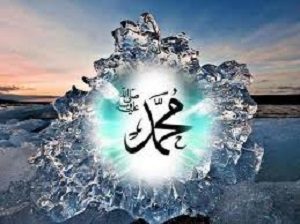 Donc, cela signifie que toute la classe est basée sur le muhabbat (amour). Quand nous prenons ce muhabbat, nous entrons dans cet océan d’amour; on va nous enseigner comment vénérer, comment avoir du respect. Ainsi nous commençons à étudier cette réalité, à apprendre de cette réalité, à nous enfoncer dans cette réalité; et ceci commence à ouvrir leur hudur (présence). Ce que vous voulez, vous devez plonger à l’intérieur.
Donc, cela signifie que toute la classe est basée sur le muhabbat (amour). Quand nous prenons ce muhabbat, nous entrons dans cet océan d’amour; on va nous enseigner comment vénérer, comment avoir du respect. Ainsi nous commençons à étudier cette réalité, à apprendre de cette réalité, à nous enfoncer dans cette réalité; et ceci commence à ouvrir leur hudur (présence). Ce que vous voulez, vous devez plonger à l’intérieur.
Vous voulez connaître ces réalités? Alors vous devriez lire à leur propos tout le temps. Et elles sont disponibles en ligne, sur NurMuhammad. Vous devriez les lire tout le temps. Vous devriez constamment entrer dans cette réalité, lire cette réalité, lire cette réalité… Vous envoyez maintenant votre âme nager dans cette réalité. Cela signifie : si c’est ce que vous voulez, vous devez être de cette réalité. Vous ne pourrez jamais l’atteindre de l’extérieur.
Ne parlez pas sans avoir été testé et formé
 Vous ne pouvez pas être une personne qui n’est jamais allée nager et essayer de décrire aux gens ce qu’est la natation. Mais c’est ainsi sur Internet. Tout le monde parle maintenant de tous les sujets possibles. Si vous dites « Avez-vous été en séclusion? »
Vous ne pouvez pas être une personne qui n’est jamais allée nager et essayer de décrire aux gens ce qu’est la natation. Mais c’est ainsi sur Internet. Tout le monde parle maintenant de tous les sujets possibles. Si vous dites « Avez-vous été en séclusion? »
« Non. »
« Avez-vous été formé puis accompagné un shaykh pendant 15 ou 20 ans? Et avez-vous été humilié et insulté, puis entraîné vers le bas et ramené vers le haut, entraîné vers le bas et ramené vers le haut? »
Ils disent : « Non, je vis avec l’un d’eux ». Cela ne veut rien dire!
« J’en connais un de loin ». Cela ne veut rien dire!
« J’en ai vu un sur Internet que je regarde tout le temps ». Non!
[Cela ne veut rien dire] jusqu’à ce que vous soyez dans la classe, inscrit pour la formation. Et sous réserve de leur entrainement, sous réserve de leur élévation puis de leur abaissement, de leur élévation et de leur abaissement, de leur élévation et de leur abaissement, pour éprouver [tester] le muhabbat (amour). Parce qu’ils ne veulent admettre aucun chien sauvage parce que les chiens sauvages vous mordent. Il n’y a aucun moyen pour un chien sauvage de passer même à travers une seule porte. Ils peuvent rester là pendant 25 ans, cela ne veut rien dire. Ils ne passeront pas la guérite de sécurité parce qu’ils ne sont pas encore domestiqués. Ça veut dire que la sauvagerie n’a pas encore été extirpée.
Le Shaykh vous exaspère pour tester votre Muhabbat (Amour)
 Alors quand on parle du muhabbat (amour), c’est un océan immense : tout le temps investi, tous les tests, toute l’agitation, toute l’aggravation est ce muhabbat. Quand on aime quelque chose, on ne voit rien de mal. Que dit-on: l’amour est aveugle, n’est-ce pas? C’est très profond. Ne laissez pas cela passer par une oreille et sortir par l’autre. Quand vous aimez quelque chose, vous ne voyez rien de mal. Quand vous n’aimez pas vraiment, vous voyez constamment tout sous un aspect négatif. Ce n’est pas le muhabbat. Ce muhabbat va commencer à ouvrir l’hudur (la présence).
Alors quand on parle du muhabbat (amour), c’est un océan immense : tout le temps investi, tous les tests, toute l’agitation, toute l’aggravation est ce muhabbat. Quand on aime quelque chose, on ne voit rien de mal. Que dit-on: l’amour est aveugle, n’est-ce pas? C’est très profond. Ne laissez pas cela passer par une oreille et sortir par l’autre. Quand vous aimez quelque chose, vous ne voyez rien de mal. Quand vous n’aimez pas vraiment, vous voyez constamment tout sous un aspect négatif. Ce n’est pas le muhabbat. Ce muhabbat va commencer à ouvrir l’hudur (la présence).
 Puis tout autour des shaykhs… chaque shaykh est unique, chacune de ces 124 000 écoles, de celles qui se manifestent [sont connues publiquement], de celles qui n’ont pas la permission de se manifester [sont cachées], chacune est unique. Vous franchissez leur porte, et tout est mis en place pour vous agacer. Tout! Du prix des haricots, du prix du sel, des biscuits qu’ils vous servent – vous n’aimez pas ces biscuits, ils vont continuer à vous les servir. On n’aime pas la saveur ou le goût et on y met du sel. On n’aime pas le thé, on le dit et on y met du sel. « Mais… Shaykh, j’ai dit que je n’aimais pas ça… » « C’est exactement ce que nous voulions savoir. Donc, vous n’aimez pas cela, nous vous en donnons beaucoup plus », parce qu’ils ne se soucient pas de ce que vous aimez. Ils ne sont pas là pour faire ami-ami avec vous; ils sont là pour faire sortir et manifester le muhabbat et l’amour hors de vous.
Puis tout autour des shaykhs… chaque shaykh est unique, chacune de ces 124 000 écoles, de celles qui se manifestent [sont connues publiquement], de celles qui n’ont pas la permission de se manifester [sont cachées], chacune est unique. Vous franchissez leur porte, et tout est mis en place pour vous agacer. Tout! Du prix des haricots, du prix du sel, des biscuits qu’ils vous servent – vous n’aimez pas ces biscuits, ils vont continuer à vous les servir. On n’aime pas la saveur ou le goût et on y met du sel. On n’aime pas le thé, on le dit et on y met du sel. « Mais… Shaykh, j’ai dit que je n’aimais pas ça… » « C’est exactement ce que nous voulions savoir. Donc, vous n’aimez pas cela, nous vous en donnons beaucoup plus », parce qu’ils ne se soucient pas de ce que vous aimez. Ils ne sont pas là pour faire ami-ami avec vous; ils sont là pour faire sortir et manifester le muhabbat et l’amour hors de vous.
Par l’agitation, le Shaykh montre de quoi vous êtes faits
Tout ce qu’il y a autour des Shaykhs est fait pour vous exaspérer. Et tout le monde autour d’eux sont simplement des boutons pour faire ressortir votre aggravation. Faites donc attention à ce que vous dites aux gens ici. Quand quelqu’un dit comme cela, vous dites « Bien sûr ». Parce que chaque commentaire que vous faites va sur votre registre muhabbat. Parce qu’ils découvrent ce qui vous aggrave, ce qui vous agite. Ils voient immédiatement tous ces traits de caractère. C’est à ce moment-là que vous savez que l’école est réelle. Parce que vous pouvez aller dans beaucoup d’endroits et ils sont juste les gens du dhikr. Ils ne sont pas des guides autorisés et ils ne sont pas autorisés à agiter et à aggraver.
 Seulement avec l’agitation, vous pouvez commencer à séparer les éléments chimiques. Ce qui peut sembler n’être qu’un au départ, quand vous l’agitez dans le laboratoire, vous faites ressortir les multiples éléments qui s’y trouvent. Alors ils veulent commencer à vous montrer et à se montrer à eux-mêmes: de quoi êtes-vous faits? Quels éléments chimiques en vous, lorsqu’agités, font surface?
Seulement avec l’agitation, vous pouvez commencer à séparer les éléments chimiques. Ce qui peut sembler n’être qu’un au départ, quand vous l’agitez dans le laboratoire, vous faites ressortir les multiples éléments qui s’y trouvent. Alors ils veulent commencer à vous montrer et à se montrer à eux-mêmes: de quoi êtes-vous faits? Quels éléments chimiques en vous, lorsqu’agités, font surface?
Donc immédiatement tout autour de vous, vous voyez que vous devenez exaspéré avec ceci, vous devenez exaspéré avec cela. Vous vous fâchez à à propos de ceci, vous vous fâchez à propos de cela. Vous êtes gentil avec certaines personnes, mais pas avec d’autres. S’il y a un gain financier, vous êtes très gentil avec eux, si vous ne recevez pas d’argent d’eux, vous ne leur parlez pas- ils ne sont même pas humains pour vous. Quel genre de caractère est-ce? Ce n’est pas le caractère musulman. Ce n’est pas la voie du muhabbat (amour).
Les Shaykhs aiment tous ceux qu’Allah (AJ) aime
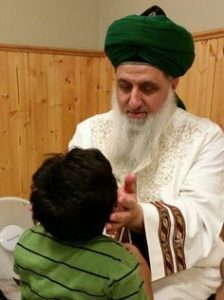 Vous aimez celui qu’Allah (AJ) aime. Vous aimez celui que le Prophète ﷺ aime et c’est tout. Et vous faites de votre mieux avec patience pour montrer cet amour et ce bon caractère. Et c’est pourquoi, quand vous voyez leur caractère, vous ne comprenez pas : pourquoi leur caractère est-il comme ça? «Si je n’aime pas quelqu’un, je ne l’aime pas». Mais ce n’est pas leur façon de faire. Ce sont les gens du muhabbat. Ils aiment celui qu’Allah (AJ) aime, même si leur corps physique ne le manifeste pas, parce qu’ils ont été formés par le muhabbat (amour).
Vous aimez celui qu’Allah (AJ) aime. Vous aimez celui que le Prophète ﷺ aime et c’est tout. Et vous faites de votre mieux avec patience pour montrer cet amour et ce bon caractère. Et c’est pourquoi, quand vous voyez leur caractère, vous ne comprenez pas : pourquoi leur caractère est-il comme ça? «Si je n’aime pas quelqu’un, je ne l’aime pas». Mais ce n’est pas leur façon de faire. Ce sont les gens du muhabbat. Ils aiment celui qu’Allah (AJ) aime, même si leur corps physique ne le manifeste pas, parce qu’ils ont été formés par le muhabbat (amour).
Gardez une trace de ce qui vous agite pour vous connaître
 Ce muhabbat signifie alors que la première règle est : «Je veux entrer dans cet amour et tout autour de ces shaykhs va m’agiter ». Soyez intelligent de noter tous les soirs ce qui vous a agité. Même si c’est le prix du riz. Pourquoi? Parce que vous êtes avares! Ce n’est pas un caractère bon et noble. Une personne aimante, une personne amoureuse, ne voit rien. Quelqu’un en amour est simplement perdu dans cet amour. Les gens amoureux ne pensent jamais à leurs poches. Chaque jour ils les vident et chaque nuit Allah (AJ) les remplit. Et leurs hisabs (les comptes-rendus de leur auto-examination) sont tous négatifs et personne ne comprend comment ils survivent. C’est l’amour parce qu’ils comptent sur Allah (AJ). Ils comptent sur le Prophète ﷺ. Ils comptent sur les ulul amr (saints) au-dessus d’eux qui les soutiennent et les maintiennent.
Ce muhabbat signifie alors que la première règle est : «Je veux entrer dans cet amour et tout autour de ces shaykhs va m’agiter ». Soyez intelligent de noter tous les soirs ce qui vous a agité. Même si c’est le prix du riz. Pourquoi? Parce que vous êtes avares! Ce n’est pas un caractère bon et noble. Une personne aimante, une personne amoureuse, ne voit rien. Quelqu’un en amour est simplement perdu dans cet amour. Les gens amoureux ne pensent jamais à leurs poches. Chaque jour ils les vident et chaque nuit Allah (AJ) les remplit. Et leurs hisabs (les comptes-rendus de leur auto-examination) sont tous négatifs et personne ne comprend comment ils survivent. C’est l’amour parce qu’ils comptent sur Allah (AJ). Ils comptent sur le Prophète ﷺ. Ils comptent sur les ulul amr (saints) au-dessus d’eux qui les soutiennent et les maintiennent.
2. Hudur (La Présence) – Avec amour, entrez dans le Hudur de votre propre Shaykh
 À ce moment-là, quand nous commençons à comprendre la profondeur de l’océan de l’amour et des épreuves, c’est là qu’ils disent : n’enlevez pas seulement toutes ces mauvaises caractéristiques, écrasez-les! Elles sont en train de sortir – vous avez la responsabilité, rentrez chez vous, écrasez votre mauvais caractère, écrasez votre mauvais caractère. Vous commencez à vous perdre dans l’amour. C’est que maintenant vous entrez dans leur hudur (présence).
À ce moment-là, quand nous commençons à comprendre la profondeur de l’océan de l’amour et des épreuves, c’est là qu’ils disent : n’enlevez pas seulement toutes ces mauvaises caractéristiques, écrasez-les! Elles sont en train de sortir – vous avez la responsabilité, rentrez chez vous, écrasez votre mauvais caractère, écrasez votre mauvais caractère. Vous commencez à vous perdre dans l’amour. C’est que maintenant vous entrez dans leur hudur (présence).
Soyez en présence du Shaykh qui lave vos impuretés
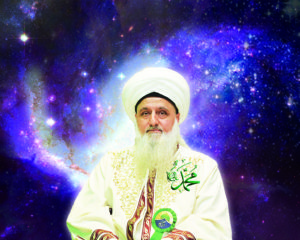 Celui que vous accompagnez, vous allez entrer dans son hudur, pas dans celui de quelqu’un d’autre. Celui qui lave vos vêtements, vous entrerez dans sa présence, sans vous soucier de quelqu’un d’autre. Celui qui lave vos fardeaux chaque fois que vous entrez, vous venez avec tous vos fardeaux, avec toutes vos caractéristiques – qui les lave ? S’il est un de ces 124000 [saints], il lave, ou elle lave. Et s’il lave, il lave selon sa capacité et il donne aux ulul amr (saints) ci-dessus de lui.
Celui que vous accompagnez, vous allez entrer dans son hudur, pas dans celui de quelqu’un d’autre. Celui qui lave vos vêtements, vous entrerez dans sa présence, sans vous soucier de quelqu’un d’autre. Celui qui lave vos fardeaux chaque fois que vous entrez, vous venez avec tous vos fardeaux, avec toutes vos caractéristiques – qui les lave ? S’il est un de ces 124000 [saints], il lave, ou elle lave. Et s’il lave, il lave selon sa capacité et il donne aux ulul amr (saints) ci-dessus de lui.
 Et c’est pourquoi vous commencez à avoir cet amour pour eux. Vous savez qu’ils prennent des fardeaux de vous. Vous savez qu’ils lavent votre linge et le rendent propre. Et les gens autour commencent à voir que vous êtes très blanc, lumineux et nurani. Ce n’est pas de vous, cela vient de celui qui lave votre linge. Ceci est l’amour.
Et c’est pourquoi vous commencez à avoir cet amour pour eux. Vous savez qu’ils prennent des fardeaux de vous. Vous savez qu’ils lavent votre linge et le rendent propre. Et les gens autour commencent à voir que vous êtes très blanc, lumineux et nurani. Ce n’est pas de vous, cela vient de celui qui lave votre linge. Ceci est l’amour.
Ne pensez pas à ce que vous donnez, pensez aux bénédictions que le Shaykh vous envoie
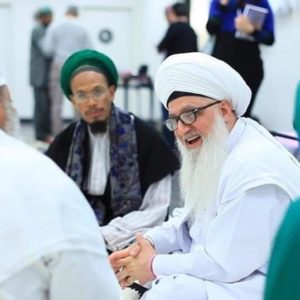 Puis ils commencent à enseigner : le rizq et la nourriture que vous donnez, ne pensez pas « Oh, regardez combien je leur ai donné », mais pensez à combien ils vous ont donné. « Ah, je leur ai donné ceci, je leur ai donné cela ». Non, non, pensez-y comme un dîner, que mashaAllah, ils vous ont donné une assiette avec 3 kebabs et ils se sont assis avec rien devant eux. Pourquoi ne pensez-vous pas à leur donner au moins la moitié de votre assiette de kebab? À cause de ce mauvais caractère encore une fois. Ils soulignent donc toutes ces réalités. Ne pensez pas que c’est à vous, que vous l’avez donné. Maintenant vous avez calculé combien était à vous – celles-ci sont toutes de mauvaises caractéristiques.
Puis ils commencent à enseigner : le rizq et la nourriture que vous donnez, ne pensez pas « Oh, regardez combien je leur ai donné », mais pensez à combien ils vous ont donné. « Ah, je leur ai donné ceci, je leur ai donné cela ». Non, non, pensez-y comme un dîner, que mashaAllah, ils vous ont donné une assiette avec 3 kebabs et ils se sont assis avec rien devant eux. Pourquoi ne pensez-vous pas à leur donner au moins la moitié de votre assiette de kebab? À cause de ce mauvais caractère encore une fois. Ils soulignent donc toutes ces réalités. Ne pensez pas que c’est à vous, que vous l’avez donné. Maintenant vous avez calculé combien était à vous – celles-ci sont toutes de mauvaises caractéristiques.
Nous prenons des provisions de Sayyidina Qasim ﷺ
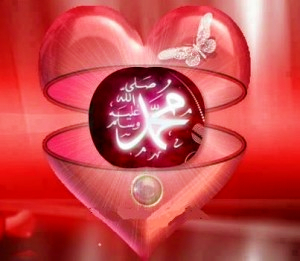 De l’océan de l’amour vient que mon shaykh envoie ce ni’mat (bénédiction). Ne sont-ce pas les qasidas que nous lisons sur Pukaro? N’est-ce pas ce que nous lisons, que nous prenons des provisions du Prophète ﷺ, Sayyidina Qasim ﷺ (Distributeur).
De l’océan de l’amour vient que mon shaykh envoie ce ni’mat (bénédiction). Ne sont-ce pas les qasidas que nous lisons sur Pukaro? N’est-ce pas ce que nous lisons, que nous prenons des provisions du Prophète ﷺ, Sayyidina Qasim ﷺ (Distributeur).
تیرا کھاواں میں تیرے گیت گاواں یا رسول الله
تیرا میلاد میں کیوں نہ مناواں یا رسول الله
یا رسول الله یا حبیب الله پکارو
Tera khavaa may teray geet, Gawaa Ya Rasul Allah
Tera Milad mai kiyo na manawaa, Ya Rasul Allah
Ya Rasul Allah, Ya Habib Allah, Pukaro
« Je mange de tes provisions et je chante ta chanson, O Messager de Dieu
Pourquoi ne devrais-je pas célébrer ton anniversaire, O Messager de Dieu
O Messager de Dieu, Bien-Aimé de Dieu »
Ce qu’Allah (AJ) donne de rahmah (miséricorde) et de provision à Sayyidina Muhammad ﷺ, nous revêtant de cette provision, la prenant du Prophète ﷺ. Ne devons-nous pas un pourcentage au Prophète ﷺ en retour? Ne lui devons-nous pas toute notre vie en retour? Ce sont donc les réalités du muhabbat.
Quand vous pensez par le biais du muhabbat (amour) et non à travers les mauvaises caractéristiques. Quand on pense à travers le filtre des mauvaises caractéristiques, « Oh, j’ai donné comme ceci, comme cela, comme cela ». Ce n’est pas de l’amour. Encore une fois, vous pourriez vous asseoir pendant 25 ans avec eux, mais ce n’est pas de l’amour. L’amour, c’est « ils m’ont envoyé ceci et j’aime manger avec eux. Voici la moitié de mon assiette, allez, prenez toute mon assiette ». C’est ça l’amour.
Vous serez avec qui vous aimez
 Avec cet amour, quand vous êtes perdu dans cet amour, votre réalité, ce n’est pas quelque chose que vous contrôlez. Vous contrôlez la quantité d’amour que vous montrez. Le hudur est actif, votre amour est comme un aimant sur leur âme. C’est pourquoi l’amour est important.
Avec cet amour, quand vous êtes perdu dans cet amour, votre réalité, ce n’est pas quelque chose que vous contrôlez. Vous contrôlez la quantité d’amour que vous montrez. Le hudur est actif, votre amour est comme un aimant sur leur âme. C’est pourquoi l’amour est important.
Tout cela vient des réalités du hadith où le Prophète ﷺ a décrit comment atteindre cette réalité, “ Vous serez avec qui vous aimez ”. Ils n’ont pas dit avec qui vous avez fait le hajj (pèlerinage), vous serez avec qui vous avez prié, avec qui vous avez fait le jummah. Allah (AJ) autorise le Prophète ﷺ, « Dis-leur qu’ils seront avec qui ils aiment ». Cela est toute la voie du muhabbat.
قَالَ رَسُول اللَّهِ صلى الله عليه و سلم : الْمَرْءُ مَعَ مَنْ أَحَب
Qala Rasulullah (saws) : « Almar o, ma’a man ahab. »
Le prophète Muhammad (saws) a dit : « Un est avec ceux qu’il aime. »
Quand ils enseignent le véritable amour, à travers toutes les épreuves et les difficultés et les luttes et les efforts, vous devenez comme un compagnon. Pourquoi les compagnons étaient-ils si amoureux de Prophète ﷺ? Ils ne savent rien sur Allah (AJ). Ils n’avaient vu aucun livre. Et chaque jour, ils ont donné leur vie pour mener deux ou trois batailles par jour. Et tous pensaient qu’ils allaient mourir. Que pensez-vous quand vous vous donnez constamment à ce niveau d’amour? Que se passe-t-il? Ceci est la réalité du hadith, « Vous serez avec qui vous aimez ».
Le Hudur est que votre lumière s’attache à la lumière du Shaykh
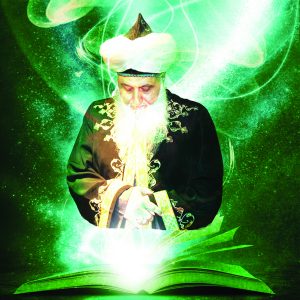 ‘Vous serez avec qui vous aimez. Non pas votre corps mais avec ce type d’amour, votre âme est perdue en eux [les Shaykhs]. Votre lumière est maintenant en train de se lier avec leur lumière parce que l’amour ouvre le cœur, pas le cerveau. Quand vous avez ce type d’amour, ce type d’ishq, vous libérez une lumière de votre cœur. De votre cœur, un lien se tisse avec leur cœur, un lien puissant. Et ils commencent à greffer votre lumière.
‘Vous serez avec qui vous aimez. Non pas votre corps mais avec ce type d’amour, votre âme est perdue en eux [les Shaykhs]. Votre lumière est maintenant en train de se lier avec leur lumière parce que l’amour ouvre le cœur, pas le cerveau. Quand vous avez ce type d’amour, ce type d’ishq, vous libérez une lumière de votre cœur. De votre cœur, un lien se tisse avec leur cœur, un lien puissant. Et ils commencent à greffer votre lumière.
3. Fana (Annihilation) – L’amour libère l’âme comme une goutte dans l’océan du Fana
 Nous avons dit tout à l’heure pourquoi Mawlana nous pose sans cesse des questions sur les mathématiques. Un plus un équivaut à quoi? Si c’est de la matière, si c’est solide et que ce sont des ordures, un et un font deux. Mais selon ce que nous ajoutons, cette formule va changer. Une lumière plus une lumière équivaut à une lumière.
Nous avons dit tout à l’heure pourquoi Mawlana nous pose sans cesse des questions sur les mathématiques. Un plus un équivaut à quoi? Si c’est de la matière, si c’est solide et que ce sont des ordures, un et un font deux. Mais selon ce que nous ajoutons, cette formule va changer. Une lumière plus une lumière équivaut à une lumière.
L’amour est nur (lumière). Ce n’est pas la physicalité. Quand vous commencez à libérer la lumière de votre âme et l’amour de votre âme, une âme et une âme, quand elles se réunissent, elles demeurent une. Il n’y en a pas deux. Cela retourne dans l’océan de ce qu’ils appellent maintenant le fana.
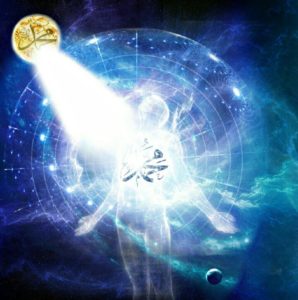 Donc ce muhabbat joint à l’hudur, c’est l’amour qui ouvre la présence. Votre lumière se déplace au-delà de votre contrôle parce que vous avez ouvert votre cœur. Vous avez dompté vos mauvaises caractéristiques. Votre mauvaise caractéristique résiste et dit, « Non, non, non, non, non », et ce sont tous les waswas (chuchotements). Donc, dès que vous commencez à écrire tous vos waswas et vous dire, « Je vais maintenant attaquer ces waswas».
Donc ce muhabbat joint à l’hudur, c’est l’amour qui ouvre la présence. Votre lumière se déplace au-delà de votre contrôle parce que vous avez ouvert votre cœur. Vous avez dompté vos mauvaises caractéristiques. Votre mauvaise caractéristique résiste et dit, « Non, non, non, non, non », et ce sont tous les waswas (chuchotements). Donc, dès que vous commencez à écrire tous vos waswas et vous dire, « Je vais maintenant attaquer ces waswas».
Les Awliya transportent notre réalité atomique dans le navire de leur âme
 Cette lumière commence à émaner, cet amour commence à nous vêtir. Vous êtes maintenant dans le hudur (présence). Votre lumière entre dans leurs lumières.
Cette lumière commence à émaner, cet amour commence à nous vêtir. Vous êtes maintenant dans le hudur (présence). Votre lumière entre dans leurs lumières.
‘Wa hamalna dhurriyatuhum, » dit Allah (AJ). Tout cela vient du cœur, « Wa hamalna dhurriyatuhum », – « Nous avons porté le dhurriyah » décrit la lumière qui s’unit. Alors, quand ils disent : « Non, non, ceci est du shirk. Vous ne pouvez pas vous réunir. » Cela n’a rien à voir avec l’adoration. Allah (AJ) décrit même dans le cœur du Coran, « Vous avez été transporté. Votre dhurriyah, votre réalité atomique est portée. »
﴾وَآيَةٌ لَّهُمْ أَنَّا حَمَلْنَا ذُرِّيَّتَهُمْ فِي الْفُلْكِ الْمَشْحُونِ ﴿٤١
36:41 – « Wa ayatul lahum anna hamalna dhurriyyatahum fil fulkil mashhooni » (Surat Yaseen)
« Et un signe pour eux est que nous avons transporté leurs atomes/ancêtres dans le navire chargé. » (Yaseen, 36:41)
Le Shaykh vous habille de sa lumière Muhammadienne
 Alors imaginez maintenant que ces lumières s’assemblent et sont en train d’être vêtues par cette lumière supérieure. La lumière Muhammadienne de cette âme habille votre lumière. Votre un+un reste un, ce qui signifie que la lumière dont ils vous habillent commencera à couvrir tout votre être. Même si seulement deux de vos atomes s’approchent d’eux, ils vont commencer à habiller tous vos atomes, toute votre lumière. Cela est le hudur.
Alors imaginez maintenant que ces lumières s’assemblent et sont en train d’être vêtues par cette lumière supérieure. La lumière Muhammadienne de cette âme habille votre lumière. Votre un+un reste un, ce qui signifie que la lumière dont ils vous habillent commencera à couvrir tout votre être. Même si seulement deux de vos atomes s’approchent d’eux, ils vont commencer à habiller tous vos atomes, toute votre lumière. Cela est le hudur.
L’océan du Tawhid – Nous sommes créés à partir d’une seule âme
 Ce hudur (présence) ouvre le fana (annihilation). Le fana signifie que votre lumière est perdue dans leur lumière. Que l’unicité de votre lumière est entrée dans l’unicité de leur lumière et que cette lumière est revenue dans l’océan de l’unicité. Et ceci est le tawhid (unicité).
Ce hudur (présence) ouvre le fana (annihilation). Le fana signifie que votre lumière est perdue dans leur lumière. Que l’unicité de votre lumière est entrée dans l’unicité de leur lumière et que cette lumière est revenue dans l’océan de l’unicité. Et ceci est le tawhid (unicité).
« Nous vous avons créés à partir d’un wahid ruhul. Nous vous avons créés à partir d’une seule âme. » Cela signifie « Nous vous divisons en de nombreuses particules différentes ».
﴾خَلَقَكُم مِّن نَّفْسٍ وَاحِدَةٍ ثُمَّ جَعَلَ مِنْهَا زَوْجَهَا…﴿ ٦
39:6 – « Khalaqakum min nafsin wahidatin thumma ja’ala minha zawjaha… » (Surat Az-Zumar)
« Il vous a créés (tous) à partir d’une seule âme, puis il a créé, de la même nature, son compagnon… » (The Troops, 39, 6)
Notre voyage commence à l’état solide Grâce au Taslim [soumission], nous pouvons nous transformer en liquide, puis en gaz

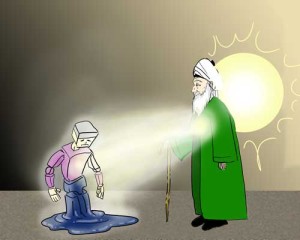
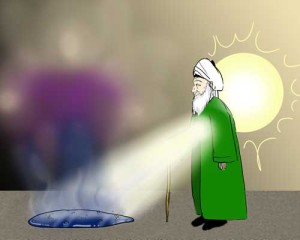 Quand vous abandonnez la forme, que vous annihilez votre forme, ré-entrez dans l’océan de l’amour, lorsque vous mettez 10 000 gouttes d’eau dans une tasse, qu’en reste-il? Une seule. Où sont toutes les gouttes? C’est pourquoi il [le shaykh] enseignait la logique selon laquelle lorsqu’on additionne la forme [solide], un verre + un verre sont deux verres. Mais quand vous parlez d’eau et de lumière, ce qui est liquide, vous avez perdu votre état de matière, vous avez perdu votre état de solidité, vous avez perdu votre forme. Parce que les trois réalités de la matière, tout cela fait partie de leurs sciences. Que si vous perdez votre forme solide, vous aurez l’état liquide. Le liquide auquel vous ajoutez liquide demeure un. Vous êtes lucide, vous êtes facile, vous vous déplacez dans n’importe quoi.
Quand vous abandonnez la forme, que vous annihilez votre forme, ré-entrez dans l’océan de l’amour, lorsque vous mettez 10 000 gouttes d’eau dans une tasse, qu’en reste-il? Une seule. Où sont toutes les gouttes? C’est pourquoi il [le shaykh] enseignait la logique selon laquelle lorsqu’on additionne la forme [solide], un verre + un verre sont deux verres. Mais quand vous parlez d’eau et de lumière, ce qui est liquide, vous avez perdu votre état de matière, vous avez perdu votre état de solidité, vous avez perdu votre forme. Parce que les trois réalités de la matière, tout cela fait partie de leurs sciences. Que si vous perdez votre forme solide, vous aurez l’état liquide. Le liquide auquel vous ajoutez liquide demeure un. Vous êtes lucide, vous êtes facile, vous vous déplacez dans n’importe quoi.
Un état liquide est en taslim, en soumission. Rien n’agite un être à l’état liquide parce que peu importe où ils vous versent, vous vous soumettez. Qui se soucie? De l’état liquide, si un peu plus d’énergie [est diffusée], vous devenez éthéré, comme du gaz. Lorsque l’eau bout, vous devenez une réalité angélique, la tajalli (manifestation) dans votre âme est comme une brise se déplaçant dans cette réalité.
Nous venons de la lumière et nous devrons y retourner
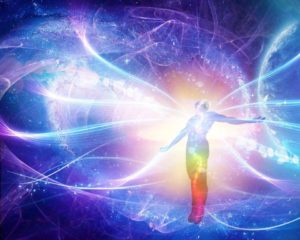 Alors toute l’école est basée sur le muhabbat (amour). Ce muhabbat libère l’âme dans leur hudur, dans leur présence. Vous gardez leur présence physique et votre âme est habillée par eux. Vous commencez à sentir leur présence spirituelle. Dans tout ce que vous faites, vous les sentez avec vous, parce que cela vient d’une seule âme. Qui est cette âme unique? La ilaha illallah, Muhammadun Rasulallah ﷺ. « Il n’y a pas de déité sauf Allah, le prophète Muhammad est le messager d’Allah. »
Alors toute l’école est basée sur le muhabbat (amour). Ce muhabbat libère l’âme dans leur hudur, dans leur présence. Vous gardez leur présence physique et votre âme est habillée par eux. Vous commencez à sentir leur présence spirituelle. Dans tout ce que vous faites, vous les sentez avec vous, parce que cela vient d’une seule âme. Qui est cette âme unique? La ilaha illallah, Muhammadun Rasulallah ﷺ. « Il n’y a pas de déité sauf Allah, le prophète Muhammad est le messager d’Allah. »
Nous avons démontré la différence avec le corps. Lorsque le corps est perdu et qu’il a été détruit, ce qui reste est une lumière. Cette lumière, son origine provident de Muhammadun Rasulallah ﷺ. De cette lumière, vous venez et à cette lumière vous retournerez. Et cela devient le fana (annihilation), lorsque nous commençons à entrer dans cette coupe, c’est le fana.
﴾إِنَّا لِلَّـهِ وَإِنَّا إِلَيْهِ رَاجِعُونَ… ﴿ ١٥٦
2:156 – « Inna lillahi wa inna ilayhi raji’oon » (Surat Al-Baqarah)
«En effet, nous appartenons à Allah, et nous Lui reviendrons.» (La Vache, 2:156)
Tout cela est le muhabbat ul-mashaykh [l’amour du Shaykh], hudur ul-mashaykh [la présence du Shaykh] wa fana, et être annihilé. Non pas dans la physicalité du shaykh mais dans le Nurul Muhammadi ﷺ [la lumière Muhammadienne] dans lequel il a été annihilé. Et tout cela commencera [à ouvrir] la porte d’à côté vers la réalité de Prophète ﷺ, inshaAllah.
Subhana rabbika rabbal ‘izzati ‘amma yasifoon,wa salaamun ‘alal mursaleen, walhamdulillahi rabbil ‘aalameen. Bi hurmati Muhammad al-Mustafa wa bi sirri surat al-Fatiha.
Un grand merci à nos transcripteurs qui nous ont aidés à transcrire la Suhba.
Date originale de la Suhba: 3 mai 2015
Related Articles:
- REALITIES OF The Face, Presence, Essence
- Face,Presence,Essence Part 2 – Love, Presence, Annihilation
- Muraqabah (Islamic Meditation), Opening the Heart: Love, Presence, Fana
- Intro Six Powers of the Heart – Haqaiq ul Qalb
- 3 States of Matter
Please Donate and support us to spread these heavenly knowledges.
Copyright © 2019 Naqshbandi Islamic Center of Vancouver, All Rights Reserved.











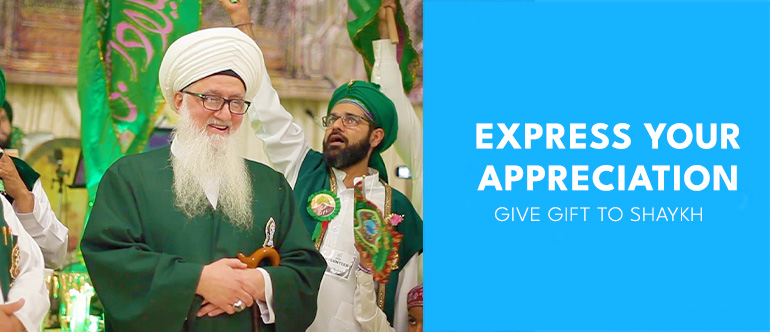

![Private: [ID: vgSYmxu1E3A] Youtube Automatic](https://nurmuhammad.com/wp-content/uploads/private-id-vgsymxu1e3a-youtube-a-236x133.jpg)
